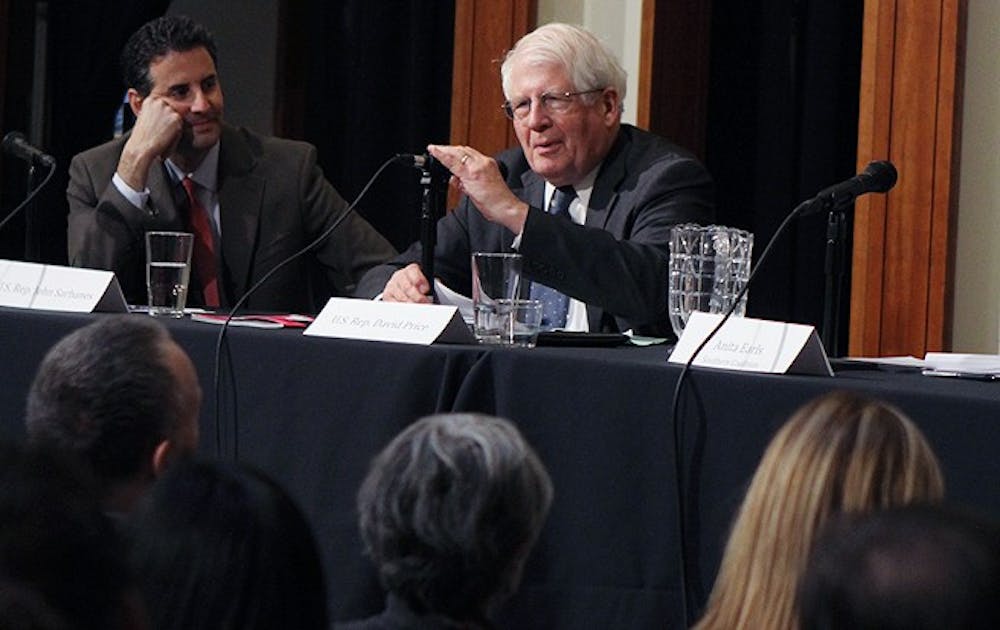Grassroots leaders are preparing for a comprehensive effort to combat the influence of Big Money on political campaigns.
The role of money in politics rose to the media spotlight in the recent elections, fueling a movement to reform the influence money wields in elections. These issues in turn fueled a discussion at the Sanford School of Public Policy Thursday, “Big Money vs. Grassroots Democracy.”
The four-person panel featured authors of legislation promoting campaign finance reform—Congressmen John Sarbanes, D-Md. and David Price, D-N.C.—as well as Anita Earls, executive director of the Southern Coalition for Social Justice, and N.C. state representative Larry Hall. They discussed the threat Big Money posed to the democratic process, as well as the best solutions to the problem.
“Fundamentally, this movement is about protecting your franchise, to let your candidate continue to represent you in Congress,” Sarbanes said.
Unrestricted private campaign donations have raised concerns about the government being bought and sold by the wealthy, which would undermine democracy, Sarbanes said.
The effects of Big Money extend beyond the ballot box, forcing congressmen to redirect time spent creating legislation to raising money instead, Sarbanes said. He estimated that congressmen devote 30 to 70 percent of their time to fundraising.
“[We are] professional fundraisers first, and professional congressmen second,” Sarbanes said.
Sarbanes described super PACs as “money drones” that generate fear and uncertainty that obstructs the political process. In this agitated environment, congressmen lack the time to connect with their colleagues—a detachment that hinders public policy.
All four panelists agreed that the solution to combatting money in politics is grassroots democracy, pointing to disclosure, public financing and a constitutional amendment as elements of a comprehensive campaign finance reform package.
“[We will create] America’s super PAC through endorsing public campaign financing,” Sarbanes said. “We’ll be the super PAC—we’re not going to surrender to the private super PAC.”
Sarbanes and Price have both proposed legislation seeking to reform the system. Sarbanes’ bill, the Grassroots Democracy Act, includes a match system for grassroots campaign contributions of $100 or less and the establishment of a “citizen-owned” People’s Fund to support grassroots candidates. Price’s proposed legislation, the Empowering Citizens Act, also establishes a matching system and creates new rules to prohibit candidate-specific super PACs.
Price pointed to the need for “an awakening of moral and political outrage” in order to catalyze change.
Although it will be difficult to obtain the bipartisan support necessary to pass comprehensive reform, Sarbanes remains confident that the combination of congressional fatigue with the current system and public moral outrage will propel the proposals forward.
“The material is there for comprehensive reform. The question is, do we have the public support? What’s it going to take to wash over these high barriers of party opposition?” Price said.
Cynicism has slowly taken the place of faith in the idea of equal representation for many voters, with the refrain “best governor, best legislature that money can buy” pervading public discourse, Hall said.
Campaign finance issues came to the forefront in North Carolina’s elections last November. Money played a decisive role in deciding senate seats, Hall said, adding that the Democratic Party lost seven seats to candidates with more resources and deeper pockets.
“When they have as much power as they have, there is no fair debate,” he said.
Big Money also influenced the state Supreme Court elections between Associate Justice Paul Newby, Trinity ’77, and N.C. Court of Appeals Judge Sam Ervin IV, Earls said. With a week left before Election Day and Ervin leading the polls, Earls said, an infusion of advertising dollars funded largely by the Republican State Leadership Committee gave the Newby campaign a boost. He won the race.
The judicial elections exemplify not only the influence of Big Money, but also the problematic conflicts of interests that it may foster, Earls said. Newby is scheduled to rule on the constitutionality of the redistricting lines issued in 2011—maps that were largely influenced by the RSLC.
“When we have money spent this way, there is no accountability in our government,” Earls said. “The problem of money in politics is a civil rights issue…. [It has] corrupted the democratic process.”
Get The Chronicle straight to your inbox
Signup for our weekly newsletter. Cancel at any time.

